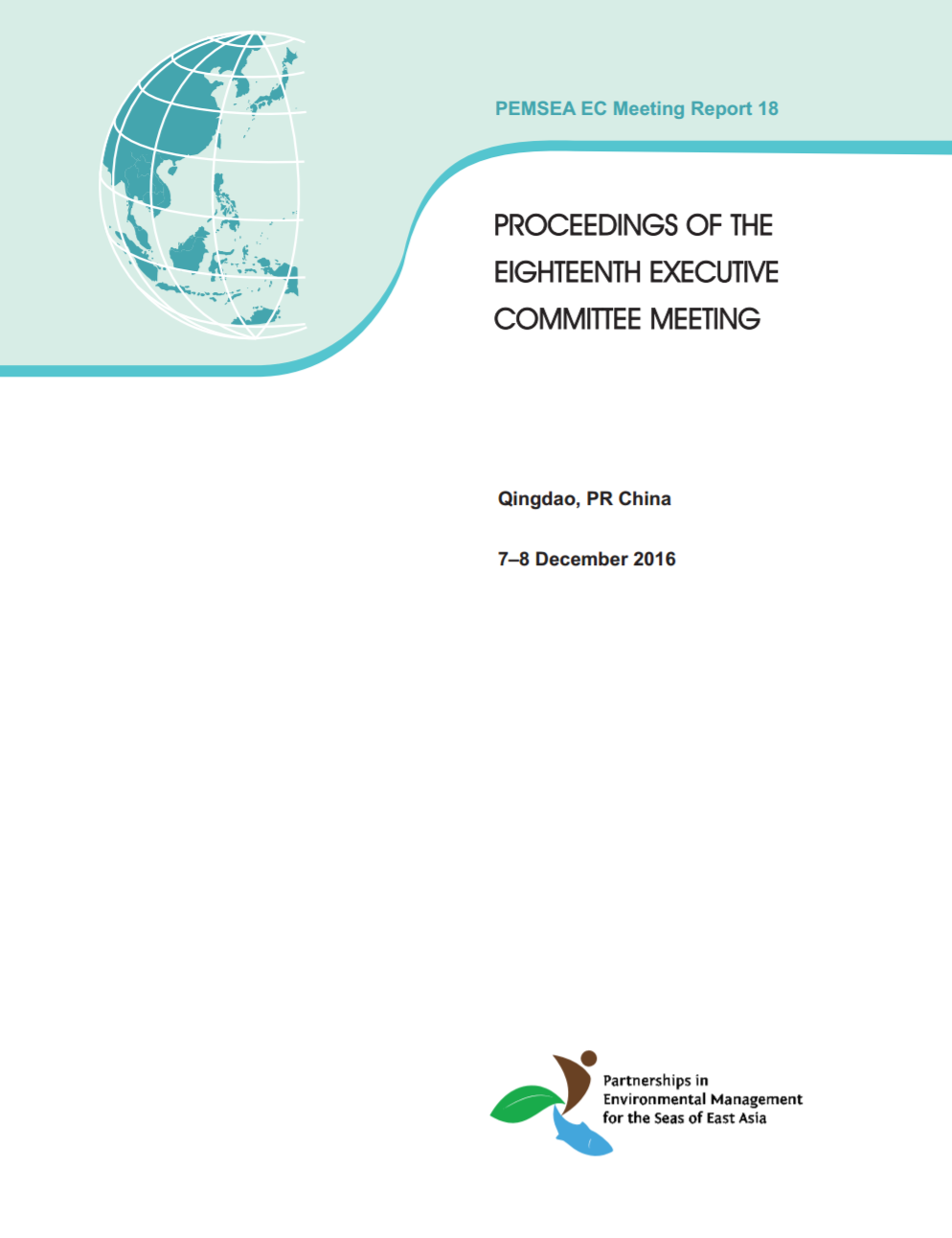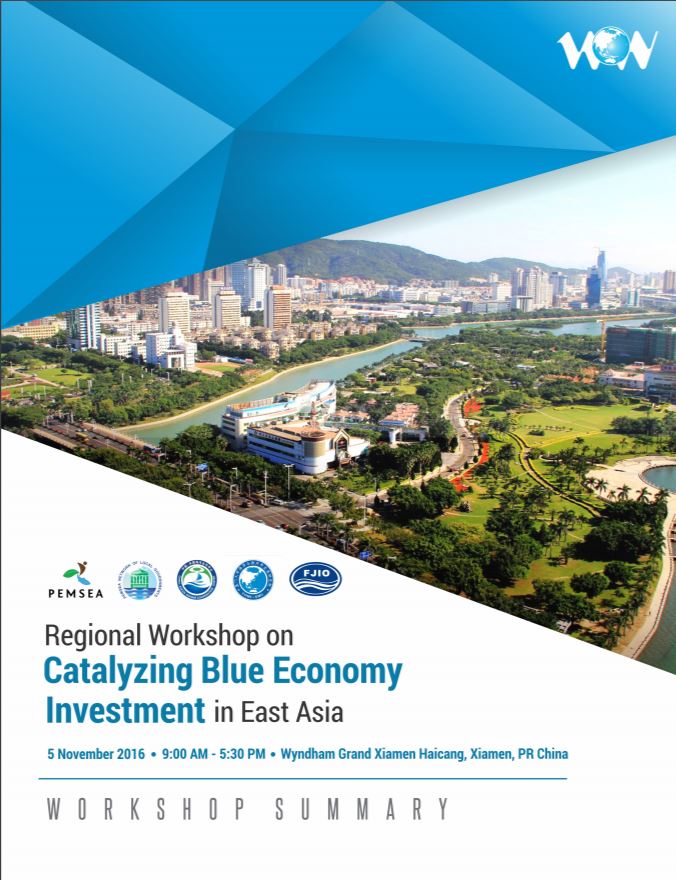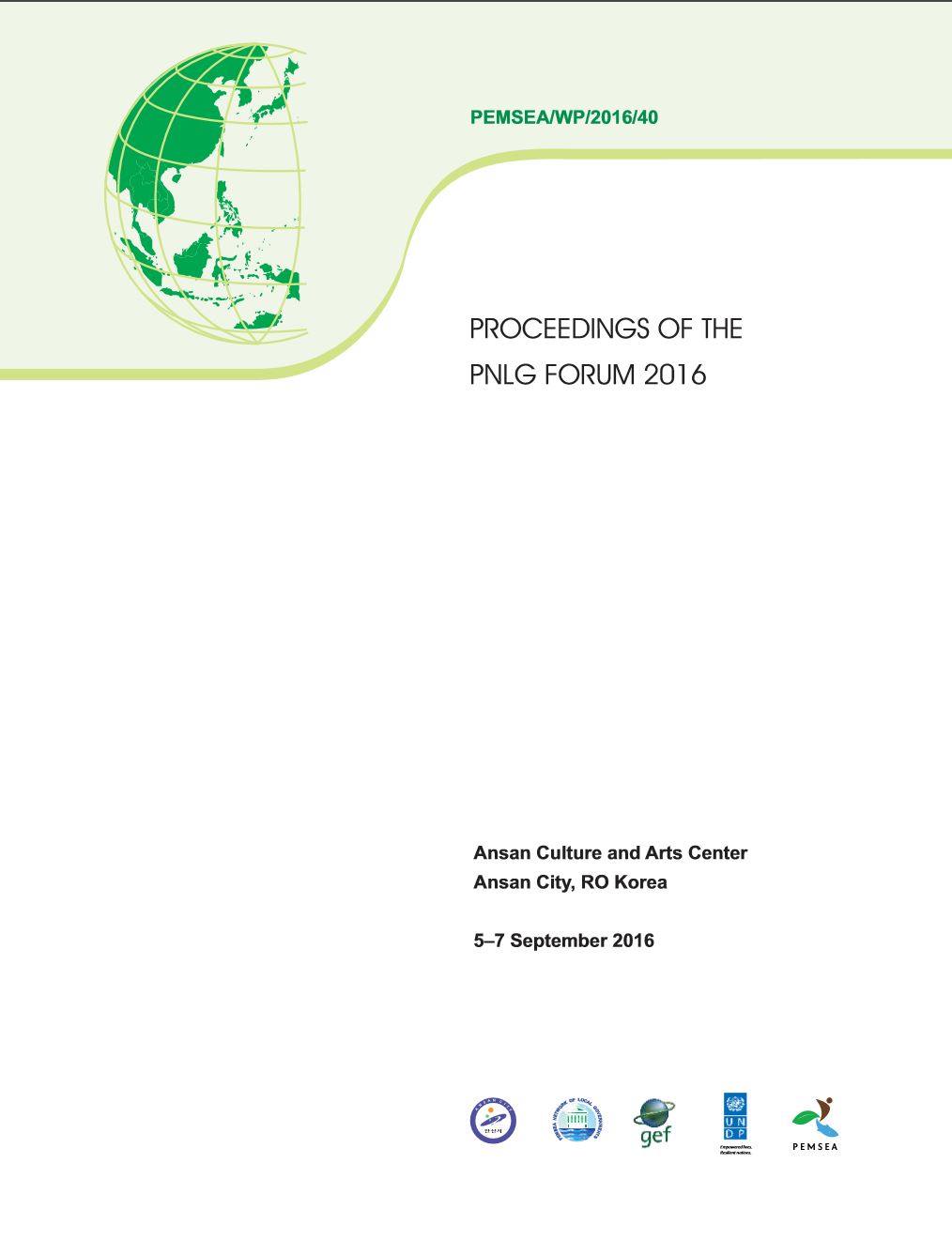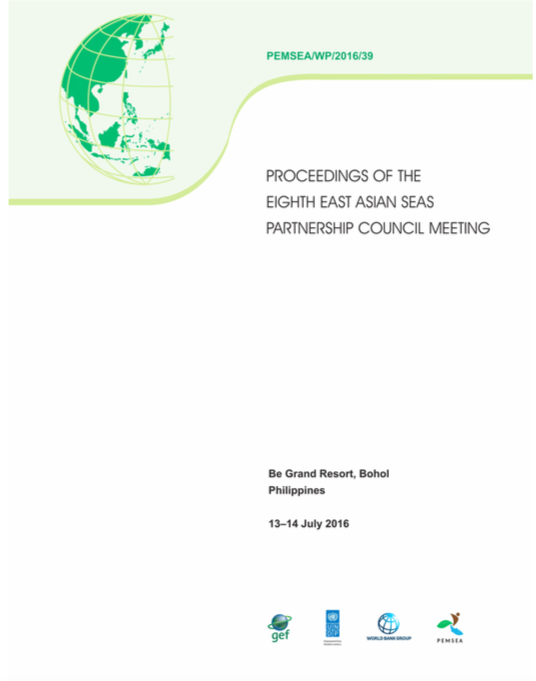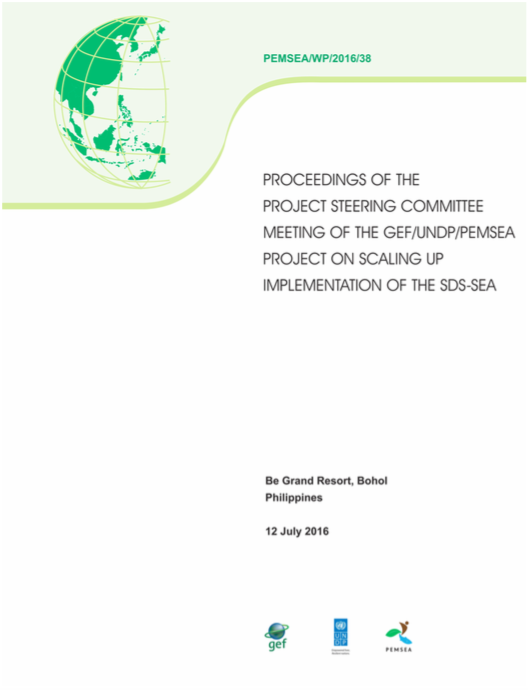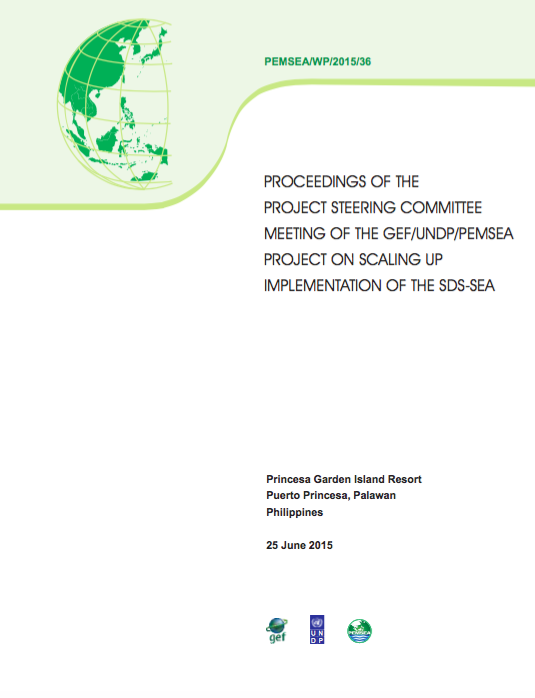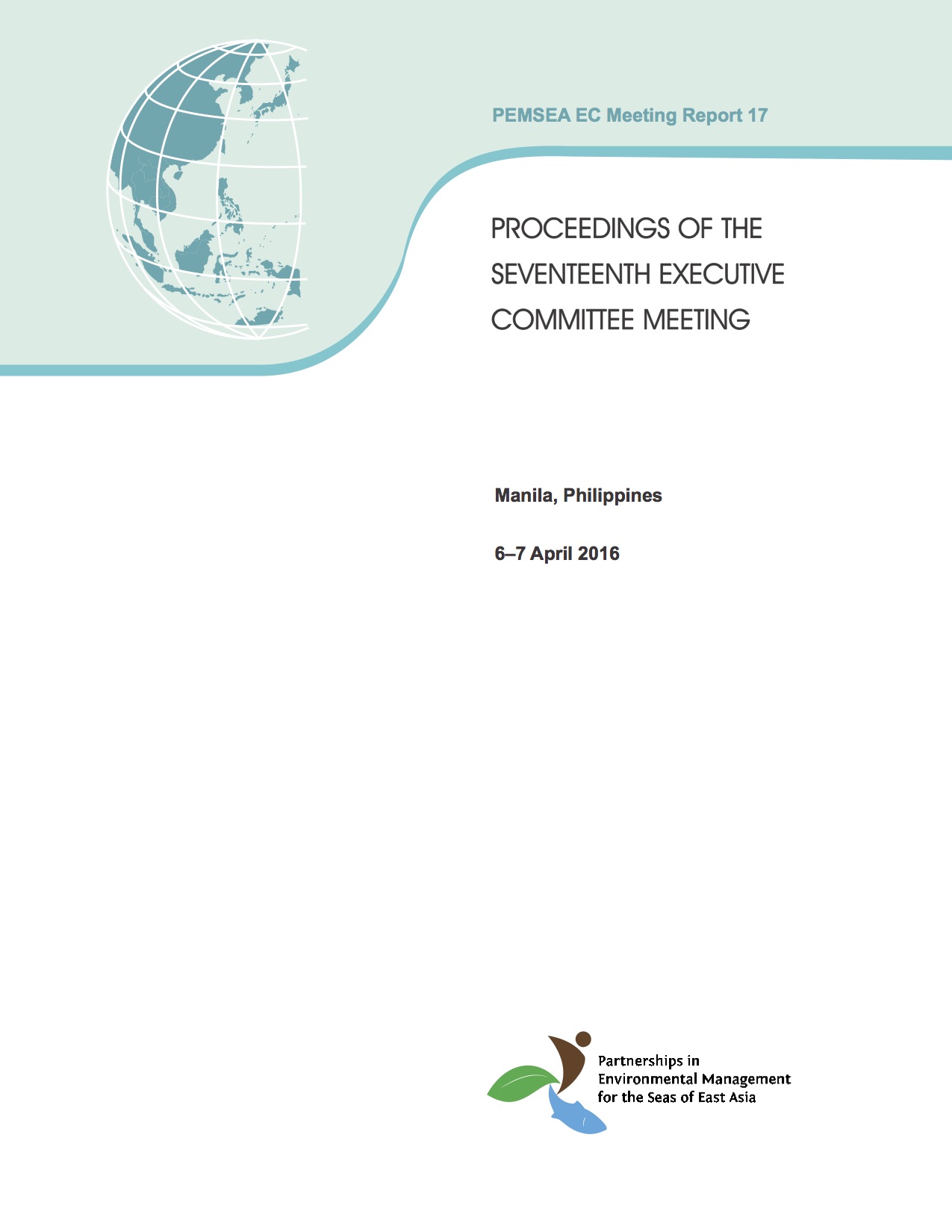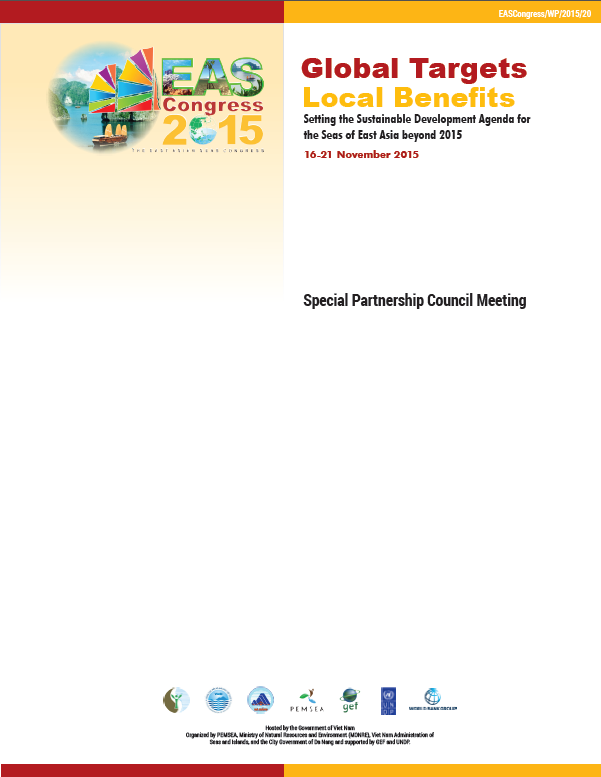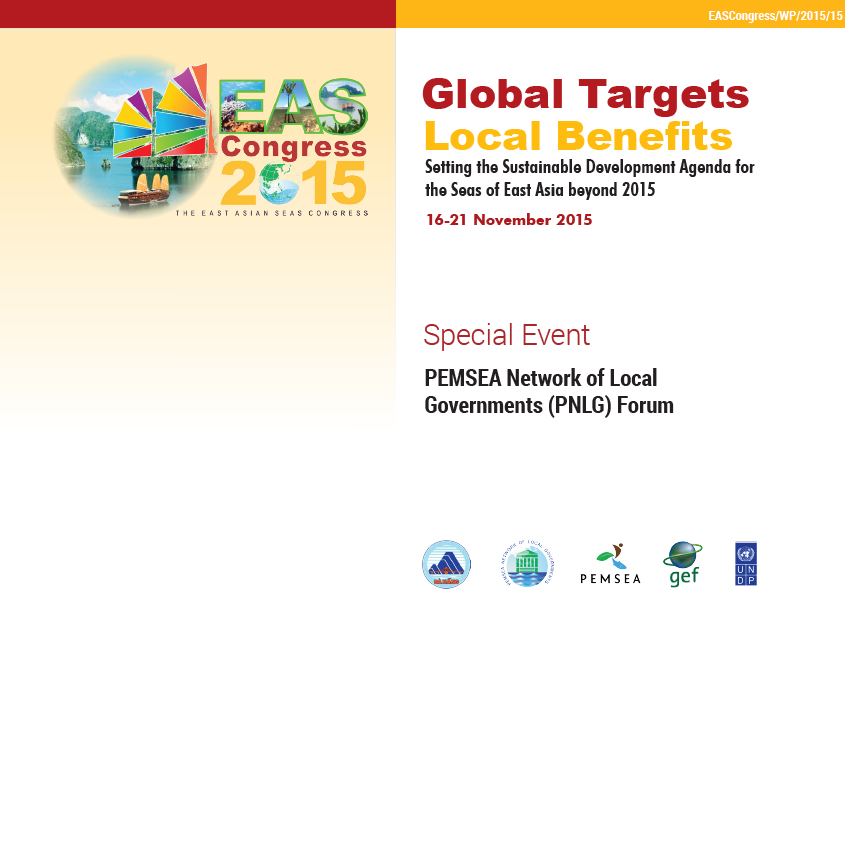
Breadcrumb
Proceedings of the Eighteenth Executive Committee Meeting
The 18th Executive Committee Meeting was held at the Intercontinental Hotel, Qingdao, PR China, on 7 to 8 December 2016. The meeting was hosted by the State Oceanic Administration of China. The meeting was attended by the EAS Partnership Council Chair, Dr. Antonio La Viña; Intergovernmental Session Chair, Dr. Zhang Haiwen; Technical Session Chair, Mr. Makoto Harunari; and Technical Session Co-Chair, Dr. Vu Thanh Ca.
Representatives from PR China, Japan, Philippines and RO Korea participated as observers. The PEMSEA Resource Facility (PRF) served as Secretariat for the meeting, with assistance from the China-PEMSEA Center.
Regional Workshop on Catalyzing Blue Economy Investment in East Asia
This 1-day workshop brought together investment professionals, financiers, development organizations, local and national government officials, project proponents, business organizations and others to provide background on blue economy investment in the region and explore the potential for developing a pipeline of bankable investment opportunities.
Proceedings of the PNLG Forum 2016
The PNLG Forum 2016 was hosted by the City Government of Ansan, RO Korea, from September 5-7, 2016 at the Ansan Culture and Art Center. Carrying the theme of “Sustainable Future Cities in the Coastal Area through UN SDGs”, the PNLG Forum 2016 assembled over 100 representatives from 30 local governments in 8 countries (Cambodia, China, Indonesia, Philippines, RO Korea, Thailand and Vietnam), as well as representatives from the PNLG associate members (Coastal and Ocean Management Institute and First Institute of Oceanography of the State Oceanic Administration of China). Observers were also present from Dili, Manatuto, Liquica of Timor Leste, and the Marine Biology Institute of Shandong Province, China.
The 2016 Forum adopted the PNLG Strategic Action Plan (SAP) 2016-2021, which aligned the ICM programs of the PNLG members with relevant UN Sustainable Development Goals (SDGs), particularly SDG 6 (Water and Sanitation), SDG 11 (Sustainable Communities and Cities), SDG 13 (Climate Action), SDG 14 (Life Below Water), and SDG 17 (Partnership building). PNLG membership was expanded to a total of 45, with the induction of five new members from Kampot, Kep, and Koh Kong Provinces, Cambodia; Tangerang Regency, Indonesia; and Sanya City, China.
Proceedings of the Eighth East Asian Seas Partnership Council Meeting
The Eighth East Asian Seas (EAS) Partnership Council Meeting was held at the Be Grand Resort, Panglao Island, Bohol, Philippines from 13 to 14 July 2016. The Department of Environment and Natural Resources (DENR) of the Philippines co-hosted the Meeting with assistance from the Bohol Provincial Environment and Natural Resources Office. The Meeting was attended by representatives from ten PEMSEA Partner Countries, namely: Cambodia, China, Indonesia, Japan, Lao PDR, Philippines, RO Korea, Singapore, Timor-Leste and Vietnam. A representative from Thailand participated as an observer. Nine representatives from Non-Country Partners were in attendance, namely: ASEAN Centre for Biodiversity (ACB); Conservation International (CI) Philippines; IPIECA The Global Oil and Gas Industry Association for Environmental and Social Issues; Korea Marine Environment Management Corporation (KOEM); Northwest Pacific Action Plan (NOWPAP); Ocean Policy Research Institute Sasakawa Peace Foundation (OPRI,SPF); Oil Spill Response Limited (OSRL); United Nations Environment Programme Global Programme of Action for the Protection of Marine Environment from Land-based Activities (UNEP-GPA); and Plymouth Marine Laboratory (PML). Representatives from the United Nations Development Programme (UNDP) participated as observers.
The Partnership Council focused on the following key issues: (a) Achieving the SDS-SEA post-2015 targets; (b) Development of the SDS-SEA Implementation Plan for 2017-2021; (c) Approval of PEMSEA Informative Documents on ICM Code, ICM System Certification and ICM Professional Certification; (d) Election of new Partnership Council Chairs and Co-Chairs; (e) Establishment of an EAS Partnership Council Subcommittee on a Self-Sustaining PEMSEA and (e) Collaborative Planning, among others. This publication summarizes the proceedings of the meeting.
Proceedings of the Project Steering Committee Meeting of the GEF/UNDP/PEMSEA Project on Scaling Up Implementation of the SDS-SEA (July 2016)
The Project Steering Committee Meeting of the GEF/UNDP/PEMSEA Project on Scaling up SDS-SEA Implementation was held at the Be Grand Resort, Panglao Island, Bohol, Philippines on 12 July 2016. The Department of Environment and Natural Resources (DENR) of the Philippines hosted the Meeting. The Meeting was attended by representatives from eight project participating countries, namely: Cambodia, China, Indonesia, Lao PDR, Philippines, Thailand, Timor-Leste and Vietnam. Three PEMSEA partner countries were present as observers and/or as contributing countries to PEMSEA: Japan, RO Korea, and Singapore. Representatives from the United Nations Development Programme (UNDP) Manila and the UNDP Regional Hub Bangkok were present on behalf of the Global Environment Facility and UNDP. The PEMSEA Resource Facility (PRF) served as the Secretariat for the Meeting. This publication summarizes the proceedings of the meeting.
DOCUMENT TITLE
China Report
Cambodia Report
Timore Leste Report
Laos Progress Report
Indonesia Report
Thailand Report
Vietnam Report
Philippines Progress Report
China Work Plan and Budget
SDS-SEA Work Plan and Budget
Proceedings of the Project Steering Committee Meeting on Scaling Up of the SDS-SEA
The Project Steering Committee Meeting of the GEF/UNDP/PEMSEA Project on scaling up implementation of the SDS-SEA was held at the Princesa Garden Island Resort, Puerto Princesa, Palawan, Philippines on 25 June 2015. The Department of Environment and Natural Resources (DENR) of the Philippines hosted the Meeting. The Meeting was attended by representatives from six project participating countries, namely: Cambodia, China, Lao PDR, Philippines, Timor-Leste and Vietnam. Three PEMSEA partner countries were present as observers and/or as contributing countries to PEMSEA: DPR Korea, Japan, and RO Korea. Representatives from the United Nations Development Programme (UNDP) Manila and the UNDP Regional Hub Bangkok were present representing the Global Environment Facility and UNDP. A representative from The World Bank was also present as an observer. The PEMSEA Resource Facility (PRF) served as the Secretariat for the Meeting.
The PSC Meeting focused on the status of the project MOA signing in countries, the regional and country work plans and budget for 2015-2016, and actions to be taken to address the gaps.
Proceedings of the Seventeenth Executive Committee Meeting
The 17th Executive Committee Meeting was held at the Marco Polo Ortigas, Manila, Philippines, on 6 to 7 Apriil 2016. The meeting was attended by the EAS Partnership Council Chair, Amb. Mary Seet-Cheng; Intergovernmental Session Chair, Usec. Analiza Rebuelta-Teh; Technical Session Chair, Prof. Chul Hwan Koh; and Council Co-Chair, Dr. Antonio La Viña.
Representatives from PR China, Philippines and RO Korea participated as observers. The PEMSEA Resource Facility (PRF) served as secretariat for the meeting.
Proceedings of the Special EAS Partnership Council Meeting (Ocean Ballroom, Furama Resort Hotel, Da Nang, Viet Nam : 18 November 2015)
The Special Partnership Council Meeting was held at Ocean Ballroom of Furama Resort Hotel, Da Nang, Viet Nam on November 18, 2015. The Ministry of Natural Resources and Environment of Viet Nam hosted the event, which was attended by representatives from 11 Country Partners and 16 Non-Country Partners. Representatives from the UNDP, UNEP, the GEF, the World Bank, CBD Secretariat, WorldFish, GIZ, and several universities also participated in the meeting.
The participants were welcomed by Ambassador Mary Seet-Cheng, Chair of EAS Partnership Council, Mr. Chu Pham Ngoc Hien, Deputy Minister of Ministry of Natural Resource and Environment of Vietnam and Mr. Stephen Adrian Ross, Executive Director of PEMSEA. Dr. Chua Thai-Eng, Chair Emeritus of the EAS Partnership Council, delivered a keynote on legacies of PEMSEA and future directions. The meeting witnessed the partnership development of PEMSEA with signing of agreements with Burapha University (Thailand), Prince of Songkla University (Thailand), National University of Timor-Leste, Oriental University of Timor-Leste and Ocean College of Zhejiang University (China) to become PEMSEA ICM Learning Centres. PEMSEA also signed an MOU with DPR Korea to expand ICM programs in the country. UNDP, the GEF, OPRI-SPF, the World Bank, CBD Secretariat, ACB and WorldFish made statements on the accomplishments of PEMSEA, opportunities of the organizational development and future areas of collaboration under the framework of the SDS-SEA 2015.
Proceedings of the 2015 PNLG Forum
Setting the Sustainable Development Agenda for the Seas of East Asia beyond 2015
16-21 November 2015
PEMSEA Network of Local Governments (PNLG) Forum 2015
INTRODUCTION
i. The 2015 Annual Forum of PEMSEA Network of Local Governments for Sustainable Coastal Development (PNLG) was held at Pullman Hotel, Da Nang City, Viet Nam, on 20 November 2015. The People’s Committee of Da Nang City hosted the Forum.
ii. The Forum was attended by representatives from 26 of the 40 PNLG Regular Members, namely: Cambodia (Sihanoukville); China (Beihai, Changyi, Dongying, Fangchenggang, Pingtan, Quanzhou, Wenzhou, and Xiamen); Indonesia (Bali Province, Buleleng Regency, and Sukabumi Regency); Japan (Shima), Malaysia (Northern Selangor, Port Klang, and Sepang); Philippines (Bataan, Batangas, Cavite and Guimaras); RO Korea (Ansan and Changwon); Thailand (Chonburi); and Viet Nam (Da Nang, Quang Nam, and Thua Thien Hue). Representatives from the two Associate Members, i.e., First Institute of Oceanography (FIO) of the State Oceanic Administration (SOA) and Coastal and Ocean Management Institute (COMI) of Xiamen University, China, also attended the event.
iii. Representatives from various local governments and institutions participated as observers, including: Cambodia (Kampot, Kep, and Koh Kong); China (State Oceanic Administration); Japan (Obama City and Omura City); Lao PDR (Champasack Province, Saravanne Province, and Sekong Province); Philippines (Bataan Coastal Care Foundation, Inc.); and Timor‐Leste (Dili Municipality and Liquiça Municipality).
iv. The PNLG Secretariat in Xiamen and the PEMSEA Resource Facility (PRF) served as the Secretariat for the forum, while the Department of Natural Resource and Environment of Da Nang City served as the local secretariat.
v. Technical Session Chair and Co‐Chair of East Asian Seas Partnership Council, PEMSEA Resource Facility (PRF) and Southeast Asia Secretariat of ICLEI – Local Governments for Sustainability also participated in the event.
vi. The meeting agenda and full list of participants are attached as Annex 1 and 2.
